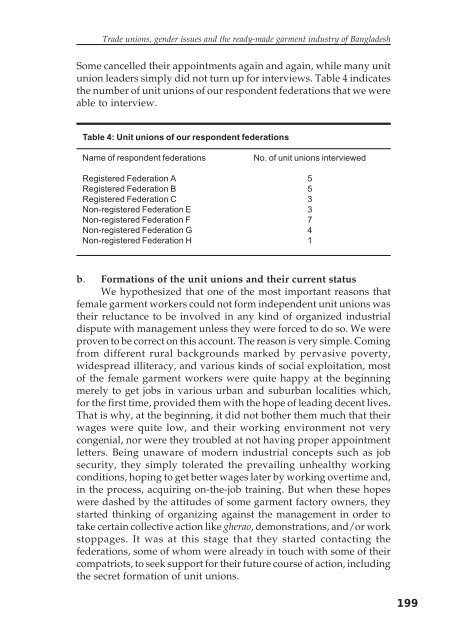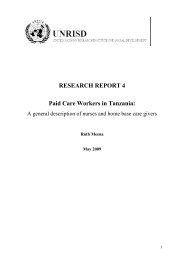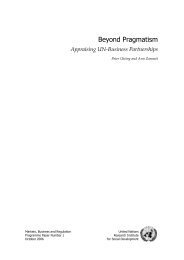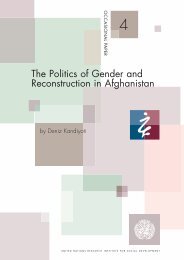Women's Employment - United Nations Research Institute for Social ...
Women's Employment - United Nations Research Institute for Social ...
Women's Employment - United Nations Research Institute for Social ...
Create successful ePaper yourself
Turn your PDF publications into a flip-book with our unique Google optimized e-Paper software.
Trade unions, gender issues and the ready-made garment industry of Bangladesh<br />
Some cancelled their appointments again and again, while many unit<br />
union leaders simply did not turn up <strong>for</strong> interviews. Table 4 indicates<br />
the number of unit unions of our respondent federations that we were<br />
able to interview.<br />
Table 4: Unit unions of our respondent federations<br />
Name of respondent federations<br />
No. of unit unions interviewed<br />
Registered Federation A 5<br />
Registered Federation B 5<br />
Registered Federation C 3<br />
Non-registered Federation E 3<br />
Non-registered Federation F 7<br />
Non-registered Federation G 4<br />
Non-registered Federation H 1<br />
b. Formations of the unit unions and their current status<br />
We hypothesized that one of the most important reasons that<br />
female garment workers could not <strong>for</strong>m independent unit unions was<br />
their reluctance to be involved in any kind of organized industrial<br />
dispute with management unless they were <strong>for</strong>ced to do so. We were<br />
proven to be correct on this account. The reason is very simple. Coming<br />
from different rural backgrounds marked by pervasive poverty,<br />
widespread illiteracy, and various kinds of social exploitation, most<br />
of the female garment workers were quite happy at the beginning<br />
merely to get jobs in various urban and suburban localities which,<br />
<strong>for</strong> the first time, provided them with the hope of leading decent lives.<br />
That is why, at the beginning, it did not bother them much that their<br />
wages were quite low, and their working environment not very<br />
congenial, nor were they troubled at not having proper appointment<br />
letters. Being unaware of modern industrial concepts such as job<br />
security, they simply tolerated the prevailing unhealthy working<br />
conditions, hoping to get better wages later by working overtime and,<br />
in the process, acquiring on-the-job training. But when these hopes<br />
were dashed by the attitudes of some garment factory owners, they<br />
started thinking of organizing against the management in order to<br />
take certain collective action like gherao, demonstrations, and/or work<br />
stoppages. It was at this stage that they started contacting the<br />
federations, some of whom were already in touch with some of their<br />
compatriots, to seek support <strong>for</strong> their future course of action, including<br />
the secret <strong>for</strong>mation of unit unions.<br />
199
















